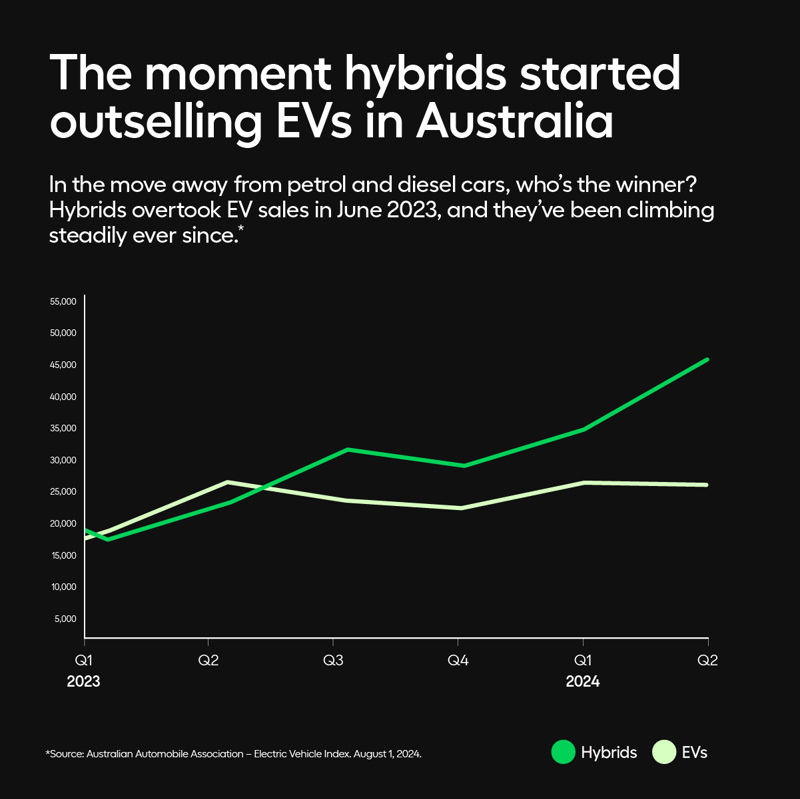As more Australian motorists think about switching from fossil-fuelled cars to greener alternatives, the choice between hybrid cars vs electric cars has become more important than ever.
But how do these two types of vehicles differ, and more importantly, which is best suited to your lifestyle? In this article, we’ll break down the key differences and the pros and cons of hybrid cars vs electric cars, including car insurance options, to help you make an informed decision.
What is a hybrid car vs electric car?
Understanding the basic differences between hybrid cars vs electric cars is the first step in working out which type might be right for you. Both offer an environmentally friendly alternative to conventional petrol or diesel engines, but they operate in different ways and can meet different needs.
What is a hybrid vehicle?
A hybrid vehicle combines a traditional internal combustion engine (ICE) with an electric motor and a battery. There are two main types of hybrid vehicles: full hybrid and plug-in hybrid.
Full hybrids – also known as hybrid electric vehicles or HEVs – use the energy generated through driving to recharge the battery. HEVs only run on electric power when the vehicle is driving at low speeds, and they’re not charged by plugging into the electricity mains.
A plug-in hybrid (PHEV) has a battery that can be charged through a power outlet or at a charging station and can drive further on that power than an HEV. It also has a petrol or diesel engine.1
“PHEVs are suitable for those who want to embrace electric driving now but have specific needs – like long-distance travel – where a fully electric option may not yet be available,” says Natalie Thompson, Senior Manager of Policy at the Electric Vehicle Council (EVC).
What is an electric vehicle?
BEVs, or battery electric vehicles, (usually just known as EVs) run solely on electricity. They don’t have petrol, diesel or LPG engines, fuel tanks or exhaust pipes.2
These vehicles, which include the popular Tesla Model 3 and BYD Seal, use batteries that can be recharged at home or public charging stations. The driving range of EVs depends on the battery capacity as well as the car’s aerodynamics, its weight and the efficiency of the electric drive unit, and can vary between models.3
What are the pros and cons of hybrid cars vs electric cars?
Choosing between a hybrid and an EV isn’t just about weighing the pros and cons of each vehicle type; it’s also about clarifying which option might serve your lifestyle best.
Motoring journalist and EV transition specialist Bryce Gaton says one of the main concerns people have about making the switch to a fully electric vehicle is ‘range anxiety’, or concern about running out of charge.
“Range anxiety tends to go away pretty quickly when people actually start driving an EV and understand how far they can travel on one charge,” Gaton explains.
“If you’re worried about it, though, I would recommend hiring an EV for a week or so before you decide so you can get a true understanding of how it might fit into your lifestyle.”
Hybrid cars pros and cons
Pros:
- Extended driving range: Hybrid cars offer the flexibility of running on both electric power and petrol or diesel, which makes them ideal for long trips or for areas with limited charging infrastructure. They can be a good fit for those who regularly drive long distances or whose lifestyle takes them to remote areas, for example, for camping or off-roading.
- Lower fuel consumption: HEVs produce lower emissions than traditional ICE vehicles and offer the flexibility of a traditional vehicle, with the added benefit of using less fuel.4
- Easier transition: For those new to electric driving, hybrids might provide a more familiar experience with the safety net of a petrol engine.
Cons:
- Complexity: The dual powertrain (the system that converts the engine’s power into movement5) in hybrid cars might lead to higher maintenance costs compared to EVs.6
- Limited electric range: Full hybrids have a relatively short electric-only range of around 50km,1 while PHEVs require regular charging to maximise their electric potential.
- Environmental impact: Although hybrids are a greener option than conventional cars, they still produce fossil fuel emissions during petrol operation.
Electric cars pros and cons
Pros:
- Zero emissions: EVs produce no tailpipe emissions, making them the most environmentally friendly option available.7 If you have invested in rooftop solar, you can charge your EV at home, doubling down on your environmental commitment.
- Lower running costs: “One of the primary advantages of EVs and powering your car using electricity is lower running costs,” says Thompson, “and generally, EVs have lower servicing needs due to fewer moving parts.” Those with rooftop solar can also likely charge at home without it significantly impacting their electricity bill.
- A nicer drive: Gaton says one of the things he likes best about EVs is the way they drive. “EVs offer a quieter and smoother driving experience, with instant torque providing quick acceleration,” he adds.
Cons:
- Driving range anxiety: Long-distance drivers or those who live in areas with limited charging infrastructure may worry about running out of battery charge. However, Australia’s extensive network of petrol stations means that this is less of a concern for hybrid drivers. Thompson notes, however, that the rollout of extensive public charging networks is well underway, with new stations being added regularly. For those who do a lot of city driving, this is less of a concern, especially if they have a home charger.
- Charging time: Recharging an EV takes longer than refuelling a petrol vehicle. The Federal Government’s Green Vehicle Guide advises charging an EV at home could take several hours, especially if your battery is low.7 Those who have a charger at home can minimise this inconvenience by charging overnight.
- Higher initial cost: Electric vehicles can be more expensive upfront, though government incentives and lower running costs can help offset this over time.
Why might a plug-in hybrid vehicle be the right car for you?
For many Australians, a plug-in hybrid offers the best of both worlds.
When longer trips are needed, the petrol engine offers the convenience of a traditional vehicle without the need to worry about charging. This flexibility makes PHEVs an attractive option for those who want to reduce their environmental impact without compromising on range or convenience.
Why might a fully electric car suit you?
If lower emissions are a priority for you, then an EV is the way to go, given they create no tailpipe emissions and have a lower carbon footprint overall.8
Increased vehicle supply also means that EVs are cheaper to buy in Australia than ever before, putting them in reach of more drivers.9
Which type of vehicle is better for long-distance travel?
When it comes to long-distance travel, hybrid cars have a clear advantage due to their extended driving range and the ready availability of petrol stations. However, the availability of public charging infrastructure for EVs is growing.
The Federal Government’s National Electric Vehicle Strategy says as of March 2024, there were around 900 public fast or ultra-fast charging locations operating across Australia, compared with just 464 sites in 2022.10
“Tools like the PlugShare app can be invaluable in helping you locate existing charging stations across the country, ensuring you’re never far from a charge when you need it,” says Thompson.
How much does it cost to insure a hybrid car vs electric car?
The process involved in insuring an electric car is generally comparable to insuring a traditional vehicle with an internal combustion engine.
As with any vehicle insurance, what is covered under your policy will depend on the type of policy you choose. Youi offers Comprehensive car insurance, Third Party Fire & Theft and Third Party Property Only.
Youi’s car insurance by make and model tool is also a great way to get a better idea of the car insurance options for your particular vehicle.

What’s next for EVs?
In Australia, the uptake of both hybrid and electric vehicles has been steadily increasing.
Between 1 April 2024 and 30 June 2024, nearly 10% of new vehicles sold in Australia were battery and plug-in electric vehicles. When hybrid cars are included, this figure rises to nearly 25%.11
According to the EVC, this means Australia is on track to hit an annual milestone of 100,000 EV sales in 2024 despite challenging economic conditions.12
“With the continued expansion of charging networks, and supply of a broader range of EV models to the market – including utes and other traditionally challenging segments – uptake of EVs is expected to accelerate even further in coming years,” says Thompson.
Looking ahead, she says the future of vehicle-to-grid (V2G) technology is particularly exciting. This technology allows EVs to not only draw power from the grid but also send electricity back into the system, acting as batteries on wheels.13
"This will help stabilise the grid during peak demand and could offer financial incentives for vehicle owners who participate – definitely something to watch," she adds.
Which vehicle is right for you?
The choice between a hybrid car vs electric car depends largely on your lifestyle, driving habits and priorities.
While hybrids offer flexibility and ease of transition, electric cars represent the future of sustainable driving with lower emissions and running costs.
Whichever option you choose, check out our car insurance options or start a quote today to see if we have the cover that’s the right fit for you.
1 Source: Australian Government Green Vehicle Guide – Hybrid vehicles
2 Source: Australian Renewable Energy Agency – Electric vehicles
3 Source: WhichCar? – The longest-range electric cars in Australia, October 2023
4 Source: Transport for NSW – Hybrid Electric Vehicle (HEV)
5 Source: WhichCar? – What is a Powertrain or Drivetrain?, July 2016
6 Source: Electric Vehicle Council – Are electric vehicles cheaper to maintain than combustion engine vehicles?
7 Source: Australian Government Green Vehicle Guide – Electric vehicles
8 Source: ABC News – Are electric cars better for the environment than fuel-powered cars? Here’s the verdict, May 2024
9 Source: The Guardian – Price driven: electric cars have never been cheaper. Is it now time to buy an EV?, June 2024
10 Source: Australian Government – National Electric Vehicle Strategy Annual Update 2023-24
11 Source: Australian Automobile Association – Electric Vehicle Index
12 Source: Electric Vehicle Council – Australia on track to break annual electric vehicle sales milestone, August 2024
13 Source: ABC News – Electric vehicles can feed power into the electricity grid, something experts say could be done more in future, July 2024




